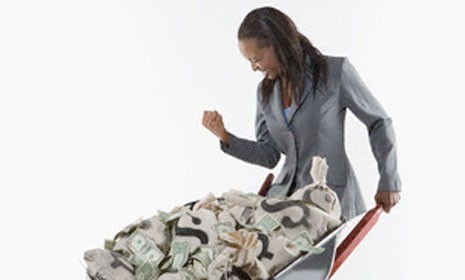Time to print more money?
The Federal Reserve signals that it might pump more dollars into the economy if things get worse. Is that a good idea?

With the recovery faltering, the Federal Reserve is considering expanding the money supply to give the economy another boost. In newly released minutes from September's Fed meetings, policy makers appeared ready to launch a second round of so-called quantitative easing — purchasing Treasury bonds to drive down interest rates and raise expectations of inflation, encouraging consumers to buy more now. But opponents of the move say the Fed would just undermine international confidence in the dollar and the U.S. economy. Is printing money the right way to get the things moving again? (Watch a Fox Business discussion about the proposal)
Firing up the printing presses could be a big mistake: Buying all these assets — up to $1 trillion worth — would merely add to "the already ballooning deficit," says Ben Baden at U.S. News & World Report. And pushing down already low interest rates would further penalize people, especially retirees, who live off the interest on their savings. "One of the biggest problems facing the economy is a lack of confidence" — so maybe the Fed should be signaling that the threat of Armageddon is past and we're getting back to normal.
"Why more quantitative easing could be a mistake"
The Week
Escape your echo chamber. Get the facts behind the news, plus analysis from multiple perspectives.

Sign up for The Week's Free Newsletters
From our morning news briefing to a weekly Good News Newsletter, get the best of The Week delivered directly to your inbox.
From our morning news briefing to a weekly Good News Newsletter, get the best of The Week delivered directly to your inbox.
This could be just the stimulus we need: Quantitative easing will "provide short term stimulus," says Jim Farrish at Seeking Alpha. So it is the right move if the Federal Reserve determines that the economy is getting worse and needs another shot in the arm. There's no denying that this will weaken the dollar, possibly expanding deficits and creating inflation. But there will be time to head off those problems once the immediate crisis has passed.
"Is this a bull market or not?"
It might help — just not very much: "Investors have been euphoric" with the hope of another flood of cash, says Kathleen Madigan at The Wall Street Journal. And the move — expected at the Fed's next meeting, in November — is "better than nothing." But the first round of easing that began in 2008 has alread made loans so cheap that any business looking to expand and create jobs could have done so already. Pushing rates a tad lower won't help "as much as some hope."
"QE2 may not be lifeboat for economy or jobs"
A free daily email with the biggest news stories of the day – and the best features from TheWeek.com
-
 How the ‘British FBI’ will work
How the ‘British FBI’ will workThe Explainer New National Police Service to focus on fighting terrorism, fraud and organised crime, freeing up local forces to tackle everyday offences
-
 The best family hotels in Europe
The best family hotels in EuropeThe Week Recommends Top kid-friendly hotels with clubs, crèches and fun activities for children of all ages – and some downtime for the grown-ups
-
 Moon dust has earthly elements thanks to a magnetic bridge
Moon dust has earthly elements thanks to a magnetic bridgeUnder the radar The substances could help supply a lunar base